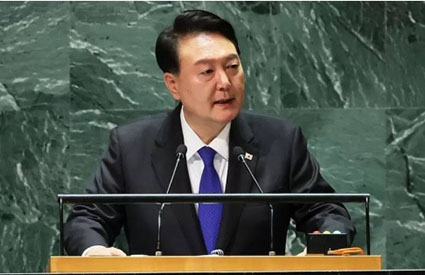Special to WorldTribune.com
 By John J. Metzler, October 6, 2023
By John J. Metzler, October 6, 2023
A wide swath of Asian security issues was discussed and deliberated upon during the recent UN General debate. Predictably, China and Korea dominated concerns though other concerns such as the South China Sea were largely overlooked.
Speaking at the start of the 78th Assembly, President Joe Biden politely addressed China’s growing military threat; He said the U.S. seeks “to responsibly manage competition” with Beijing “so it doesn’t tip into conflict.” True but this all sounds a bit mercantile; Evoking trade competition, markets and balance sheets. Not the dangerously tipping military balance in the Pacific.
Biden stressed that U.S. policy towards China is based on “de-risking, not de-coupling” adding that “while Washington will stand against China’s aggressive actions, the U.S. is also ready to work with Beijing on issues like climate change.” All pretty vapid. We should note that since the vaunted Paris Climate Agreement of 2015, Beijing’s coal fired energy plants have been puffing away at an alarming rate; China has doubled its coal plant capacity since 2019!
Addressing the situation on the divided Korean peninsula, South Korean President Yoon Suk-Yeol warned, “The nuclear and missile programs of the Democratic People’s Republic of Korea pose not only a direct and existential threat to the peace of the Republic of Korea, but also is a serious challenge to peace in the Indo-Pacific region and across the globe.”

No question, but despite many Security Council resolutions banning North Korean nuclear and missile firings, the Pyongyang regime continues testing unabated.
President Yoon added warily, “If the DPRK acquires the information and technology necessary to enhance its WMD capabilities in exchange for supporting Russia with conventional weapons, the deal will be a direct provocation threatening the peace and security of not only Ukraine but also the Republic of Korea.” In other words, shall Moscow enhance Pyongyang’s technological capacity?
He warned, “The Republic of Korea together with its allies and partners, will not stand idly by.”
Japan’s Prime Minister Kishida was a bit less direct stating, “Japan’s policy on North Korea remains unchanged. Japan seeks to normalize its relationship with North Korea… through resolving outstanding issues of abductions, nuclear and missile issues, as well as settlement of our unfortunate past.” He added, he would like to “meet President Kim Jong-Un face to face at any time without and conditions.” Nonetheless there were no direct mentions of Mainland China.
Australian Foreign Minister Penny Wong warned, “The Indo-Pacific is home to unprecedented military build-up, yet transparency and strategic reassurance are lacking.” She added, “Tension is rising between states with overlapping claims in the South China Sea, and disputed features have been militarized.”
Minister Wong asserted, “North Korea continues to destabilize with its ongoing nuclear weapons program and ballistic missile launches, threatening Japan, the Republic of Korea and the broader region.”
Interestingly Czech President Petr Pavel argued, “We deplore China’s military actions which raise tensions in the Taiwan Strait, and its unfriendly actions against partners in the South China Sea. Any dispute or contagious issue must be solved peacefully. Any potential armed conflict in the region would have negative consequences for the whole world.”
In the absence of President Xi Jinping or his Foreign Minister Wang Yi, China sent a mid-level delegate vice president Han Zheng, who reaffirmed Beijing’s dedication to close links with the developing world aka the Global South. Han nonetheless became strident on Beijing’s views of its national sovereignty; “No one, no force should ever underestimate the firm resolve, strong will or the power of the Chinese people to safeguard their sovereignty and territorial integrity,” he said. All part of Beijing’s classic bullying and threats towards democratic Taiwan.
Han’s remarks underscored that there is only one China in the world represented by the government of the People’s Republic of China; “Realizing China’s complete reunification is a shared aspiration,” his government will “continue to strive for peaceful reunification with the greatest sincerity and utmost effort.”
Despite China’s assertions, more than a dozen UN members such as Guatemala, St. Lucia and Paraguay called for Taiwan’s participation in the United Nations.
Myanmar aka Burma, controlled by a military junta, has routinely trounced human rights and sanctioned humanitarian crackdowns; But Burma’s fate was barely mentioned except by Singapore’s eloquent Foreign Minister Vivian Balakrishnan and Malaysian Prime Minister Datuk Anwar Ibrahim who decried, “The barbarism and depravity inflicted upon the people of Myanmar is indefensible.”
All studiously careful words from world leaders, who are tiptoeing around China’s growing military threat and North Korea’s blatant missile proliferation.
John J. Metzler is a United Nations correspondent covering diplomatic and defense issues. He is the author of Divided Dynamism the Diplomacy of Separated Nations: Germany, Korea, China (2014). [See pre-2011 Archives]
